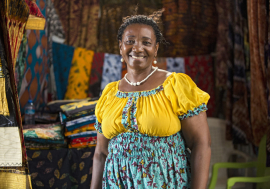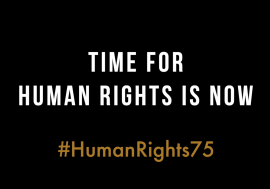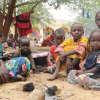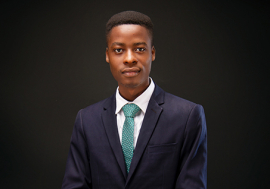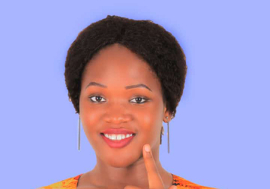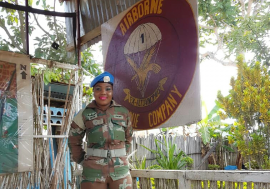Kossi Gavon, 24, is a lieutenant from Togo serving in the UN Peacekeeping Mission in Mali. (MINUSMA). One of the youngest peacekeepers, he is the Chief of Staff managing the office of the Togolese battalion commander. He says he is grateful for the opportunity to serve and learn:
You are one of the youngest peacekeepers in the Togolese battalion in the mission in Mali. How did you manage to get deployed?
It wasn’t a personal choice. I arrived on Malian soil on an administrative assignment. As the military, our duty is to protect the civilian population and to protect the interests of our countries. Stability in the [West African] sub-region is one of these interests, and as there is a need in Mali, our seniors saw it fit to send us here. They are committed to the stability in the sub-region, and it is with that in mind that I was assigned to the mission.
Being young, how do you feel about being on such an important assignment?
I feel privileged. It is important to involve young officers in missions like this.
What are your functions on a daily basis?
I am in charge of human resources and I am also the Chief of Staff of the Togolese battalion commander. I work with the other staff officers, especially in operations and intelligence. This allows me to acquire additional skills, and I benefit a lot from their experience.
Being young and working with senior staff officers appears to be an asset for you. What would be two or three things you have learned from them?
I work with much more experienced officers who completed many staff courses. I have learned a lot from them, especially in the areas of planning and organization. There are many things to do before deployment missions, and they help me in organizing my work properly.
Are there any downsides to being so young in peacekeeping?
Being the youngest here, I think what I miss most is my family. But I can reassure you that there is a second family that fills the void - my military family here. Together, we have a very close bond.
You are involved mostly in administrative tasks. Do you ever find yourself in the field and or on the frontline?
I can say that by being in the theater of operation, we are in combat since UN bases are not spared from attacks by jihadist groups. Working in these conditions, one doesn't necessarily need to go out to the field to say that they are in combat.
How is your typical day like?
As chief of staff, I have to follow up on the agenda of the Colonel commanding the battalion, and attend and follow up on everything that falls under him. And as head of human resources, I am also responsible for following up on personnel issues.
How do you feel when your colleagues are out there on the frontline, facing danger on a daily basis?
There are several emotions at once. I am concerned when my comrades are in the field because the threat is real, it's present and it's not negligible. But when they accomplish their mission and they come back, I am at the same time fulfilled because we are accomplishing a noble task, which is protecting the civilian population and maintaining peace in our zone of responsibility.



